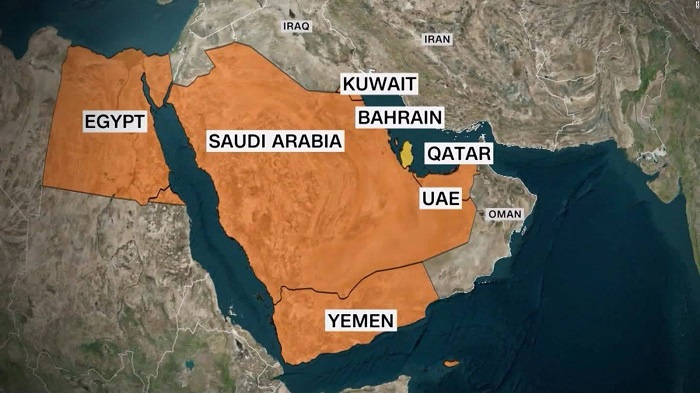A Crisis of Opportunity: Iran and the case of Qatar

The month-long Qatar crisis, precipitated by Saudi Arabia, UAE and Bahrain, with their long list of sovereignty-violating demands tantamount to sheer bullying, is in fact a crisis of opportunity for Iran that will enhance Iran's regional influence as this crisis drags on. This is, first and foremost, an inter-GCC (Gulf Cooperation Council) crisis that spells long-term doom for GCC unity, which has been for decades a stable feature of GCC-Iran relations.
Lest we forget, the GCC was founded as a counter-Iran bloc in the aftermath of the Islamic Revolution, intent on preventing the spread and export of Iran's revolution to the Persian Gulf oil sheikhdoms protected by the US power. Since the early 1980s, the GCC has toyed with a number of military and security doctrines, e.g., a common "Gulf shield," inter-operability of defense forces, and most recently an "Arab NATO," none of which have gone too far, in part due to the fear of smaller GCC states from being swallowed up by the big Saudi brothers. That fear is now at all-time high, fever pitch, in Qatar today, that finds itself in the greatest foreign crisis since its independence in 1971. As a result, even if this crisis is quickly resolved, its ramifications for GCC will linger for a long time, precluding any pretense of unity and "common defense."
Second, in light of the blunt ultimatum given to Qatar by the hostile trio, this crisis in a certain sense resembles the Kuwait crisis of 1990-91, when tiny Kuwait was invaded and temporarily absorbed by Iraq. There is a small chance of this crisis turning real ugly with a military dimension, which will cause major turbulence in Persian Gulf affairs, should the aggressive Saudis feel out of any other option to bring Qatar to its knees. The super-rich Qataris have so far weathered the crisis by accessing the ports in India and Oman and using Iran's air space, while relying on robust Turkish support, and continuing with their purchase of cutting-edge military hardware, thus bolstering their defense. Consequently, the military option is highly unlikely, in light of the strong presence of US military personnel in Qatar as part of the US Central Command (CENTCOM). US is therefore obligated to defend Qatar's sovereignty, thus introducing yet another hurdle before the military option. Qatar's maneuver to threaten to get closer to Iran if the Saudis persist with their bullying tactics might actually work and have the desired effect in turning this crisis in Qatar's favor.
Third, Kuwait and Oman have been neutral in this crisis that also raises concerns among the smaller GCC states about Riyadh's unacceptable behavior, reminding some of Saddam Hussain's aggression. The Saudis have their hands full in Yemen and can ill-afford yet another military campaign, which would definitely impact their performance in the Yemen theater, thus giving rise to the educated guess that the anti-Qatar alliance will simply seek to tighten the screws around Qatar with financial and other sanctions, hoping that the Qatari elite will buckle under pressure -- an unlikely scenario. Qatar is a small state with deep resources and considerable amount of 'soft power' that can be utilized to ward off the damage of sanctions and other punitive measures imposed by the Saudi-led bloc.
Fourth, so far Qatar's response has been diplomatically smart, linking their acceptance of the list of demands on other GCC states behaving similarly and self-imposing the same limitations, e.g., with respect to Iran, in light of the UAE's important trade and financial relations with Iran. Indeed, the irony of UAE calling on Qatar to downgrade ties with Iran while they are poised to take advantage of the post-sanctions trade with Iran is inescapable. The UAE is bound to lose billions of Iran trade if it persists with this destructive approach toward Qatar and continues to toe Saudi Arabia's unworkable options vis-a-vis Doha, presently entertained at a Cairo gathering of foreign ministers. There is, in fact, no viable option for the anti-Qatar Arab alliance led by Saudi Arabia than to lower their expectations and be satisfied with token results, otherwise it will definitely backfire on them and Iran will harvest the net gain.

